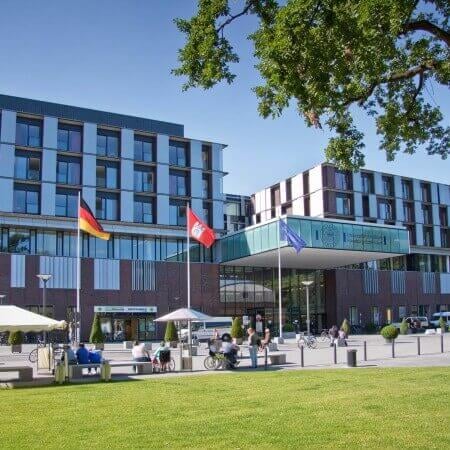T-cell lymphoma is a tumor of immune T-cells that can be aggressive or indolent (slow-growing). Aggressive tumors are more difficult to treat, but thanks to the introduction of new medicines and treatment procedures, doctors abroad are achieving outstanding success in the fight against even this severe disease. You can undergo your treatment of aggressive T-cell lymphoma in one of the developed countries to cure the disease completely or achieve remission that will last for many years. If you are going to travel abroad, then you are kindly welcome to book your medical program through the Booking Health service.
Content
- Principles of treatment
- Chemotherapy
- Immunotherapy
- Targeted therapy
- Stem cell transplant
- CAR T-cell therapy
- Where to undergo T-cell lymphoma treatment?
Principles of treatment
There are 27 types of aggressive T-cell lymphomas. Recent gene expression profiling (GEP) and whole genome sequencing technology have provided additional information that allows subtyping within types. Since there are many variants of the disease, and each type of lymphoma has its own characteristics, doctors resort to a personalized selection of a treatment regimen that would suit a particular patient.
The neoplasms are divided into T-cell lymphoblastic lymphoma and peripheral T-cell lymphomas, the most common of which are adult T-cell leukemia, cutaneous T-cell lymphomas, and angioimmunoblastic T-cell lymphoma, extranodal NK/T-cell lymphoma, anaplastic large cell lymphoma, and intestinal T-cell lymphoma.
The treatment usually begins with one of several standard regimens. It includes only chemotherapy or goes with the addition of monoclonal antibodies, antibody-drug conjugates, or drugs for targeted therapy. If the treatment regimen does not work or the disease recurs, then the regimen is changed. In severe cases, doctors may resort to a stem cell transplant or CAR T-cell therapy.
Chemotherapy
Many groups of chemotherapy drugs are successfully used for various types of T-cell lymphoma. The patients with this disease are prescribed alkylating agents, glucocorticoids, platinum-based drugs, purine analogs, anthracyclines, antimetabolites, and other agents in various combinations. The CHOP regimen is the most widely used. The CVP regimen is also often used.
The CHOP regimen is effective in 80-85% of cases. In younger patients who can tolerate an aggressive drug treatment regimen, another chemotherapy drug can also be added. As a result, doctors achieve a 12-year survival rate of 70%. Moreover, in ALK positive tumors, three-quarters of patients are completely cured.
Recent clinical studies show that the latest drugs and regimens are even more effective for the treatment of aggressive T-cell lymphoma compared to the CHOP regimen. Therefore, specialists in developed countries often prescribe the CHOP regimen in combination with an antibody-drug conjugate as the primary treatment.
Chemotherapy is often not the only treatment option. The drug therapy regimen also includes drugs for targeted therapy and immunotherapy.
The treatment usually begins with standard regimens. A person undergoes several cycles of chemotherapy in order to keep the disease under control for as long as possible. But if the drugs no longer work, then the regimen will be changed.
Some patients require intrathecal chemotherapy. The drugs are injected into the cerebrospinal fluid to destroy cancer cells in the central nervous system.
Immunotherapy
Immune cells do not attack lymphoma cells well. They disguise themselves as the patient's normal cells, so they do not meet a worthy response from the immune system. But immunotherapy can make a difference. Doctors use antibodies as medicines, which:
- themselves can attack cancer cells;
- deliver chemotherapy drugs inside cancer cells by interacting with receptors on their surface.
In some cases, doctors also use immunomodulators, a group of drugs that increase immune responses and make the patient's own immune system attack the tumor more actively. In the past, these drugs were used more often, but now they are used when other treatments do not work.
Here are the main groups of drugs used by foreign doctors in the treatment of T-cell lymphomas:
CD52-targeting antibodies. The drugs are administered intravenously, usually three times a week. The course of treatment lasts up to 12 weeks. The most common side effects are fever, chills, nausea, and rash. The use of these medicines contributes to lowering the immune cell levels, but usually not so much as to weaken the defense against infections. If the immune cell levels decrease more than expected, the patient receives additional antibiotics and antiviral drugs.
CD30-targeting antibodies. Antibody-drug conjugates deliver the chemotherapy drugs inside the cancer cells. This approach has shown excellent results in clinical trials, so drugs in this group are increasingly being used in the first-line therapy regimens. CD30-targeting antibodies can also be used for recurrent T-cell lymphomas. The drug is highly effective for anaplastic large cell lymphoma (ALCL), the cells of which have CD30 receptors. The drug is administered intravenously, one time in 3 weeks. The intake of this medication may cause side effects, such as nerve lesions (neuropathy), a low blood cell count, fatigue, fever, nausea, diarrhea, and cough.
CD25-targeting antibodies. This receptor has been considered a therapeutic target for more than 20 years. Although monoclonal antibodies did not show any significant results for it, the antibody-drug conjugate was more successful. This drug is used for cutaneous T-cell lymphoma, either alone or in combination with the CHOP regimen. Some hospitals have already begun to carry out radioimmunotherapy: radioactive substances are attached to CD25 antibodies, which destroy the tumor with radiation.
Targeted therapy
The following drugs can be used for targeted therapy:
Histone deacetylase inhibitors. These are the drugs that can affect the activity of genes by interacting with proteins in chromosomes called histones. They can be used to treat peripheral T-cell lymphomas, usually as second-line therapy. The drugs are administered intravenously, usually one time per day, for five days in a row, repeating the course every three weeks. Side effects include nausea, vomiting, fatigue, and low levels of red blood cells.
PI3K inhibitors. Phosphatidylinositol 3-kinases (PI3Ks) are a family of proteins that send signals that affect cell growth. The drugs that target these proteins are known as PI3K inhibitors. They are more commonly used for B-cell lymphomas, but they are already showing good results for T-cell tumors in clinical trials.
Stem cell transplant
Young patients and children undergo a stem cell transplant in the most severe cases, including relapse of the therapy-refractory lymphoma. This procedure allows doctors to achieve long-term remission, although it is complex and unsafe because donor cells have to be transplanted. In developed countries, the procedure is successful in most patients.
Allogeneic (from a donor) stem cell transplant is a non-specific immunological therapy option. The clinical outcome is based on a graft-versus-lymphoma effect.
The essence of this treatment is as follows:
- Doctors use high doses of chemotherapy drugs to kill as many cancer cells as possible.
- Donor stem cells are injected intravenously so that they are fixed in the bone marrow and restore the function of hematopoiesis.
A few weeks after the stem cell transplant, the patient's production of blood cells, including immune cells, is restored. Immunity is actually updated. If the patient's immune cells practically did not attack the tumor, then the renewed immunity produces more aggressive leukocytes toward the lymphoma. With the most favorable treatment outcome, immune cells destroy the lymphoma completely.
The efficiency of the stem cell transplant is very high, and in some, the most severe groups of patients, this procedure simply has no alternative. Even among those whose lymphoma has recurred after the initial treatment and does not respond to drug therapy, more than half of patients with cancer are cured by an allogeneic stem cell transplant.
CAR T-cell therapy
CAR T-cell therapy is not yet part of the standard treatment for T-cell lymphoma. However, it is already showing excellent results in clinical trials, so it may be a good option for patients with a poor prognostic disease who do not respond to other treatments.
The target for CAR T-cell therapy is CD30 cells. The essence of the method is that the doctors take the patient's own leukocytes, modify their genes, multiply them and administer them into the patient's body. The altered cells attack the lymphoma cells and put the disease into remission. Studies show a high rate of complete response (elimination of all tumors), which is achieved within a month after the start of therapy. In half of the patients, remission lasts more than one year. In some patients treated with CAR T-cell therapy, the disease is cured completely.
Where to undergo T-cell lymphoma treatment?
You can undergo your treatment for aggressive T-cell lymphoma in one of the developed countries. There are a few reasons for you to go abroad to fight this disease:
- the availability of the latest drugs that are not yet used in countries with poorly developed medicine;
- a high probability of a complete cure of the disease, especially in ALK-positive tumors;
- a personalized treatment based not only on the type but also on the molecular subtype of the lymphoma;
- successful treatment of even the most severe forms of the disease with the help of stem cell transplant and adoptive cell technologies;
- a high-quality accompanying therapy, which improves the tolerability of treatment and reduces the risk of severe complications.
You are kindly welcome to use the Booking Health service to make your appointment for T-cell lymphoma treatment abroad. On our company's website, you can see the cost of treatment and compare prices. When making your appointment through the Booking Health service, the cost of treatment for you will be lower than when contacting the hospital directly due to the lack of coefficients for foreign patients. We will help you to choose the most suitable hospital that specializes in treating T-cell lymphoma and arrange your trip abroad.
Authors:
This article was edited by medical experts, board-certified doctors Dr. Nadezhda Ivanisova, and Dr. Bohdan Mykhalniuk. For the treatment of the conditions referred to in the article, you must consult a doctor; the information in the article is not intended for self-medication!
Our editorial policy, which details our commitment to accuracy and transparency, is available here. Click this link to review our policies.
Sources:
National Center for Biotechnology
European Society for Medical Oncology
Cancer Research Institute



















